Xinhua Headlines: Scorched lands, scarred souls -- Mideast's agonies spotlighted on World Humanitarian Day
Source: Xinhua
Editor: huaxia
2025-08-19 21:01:15
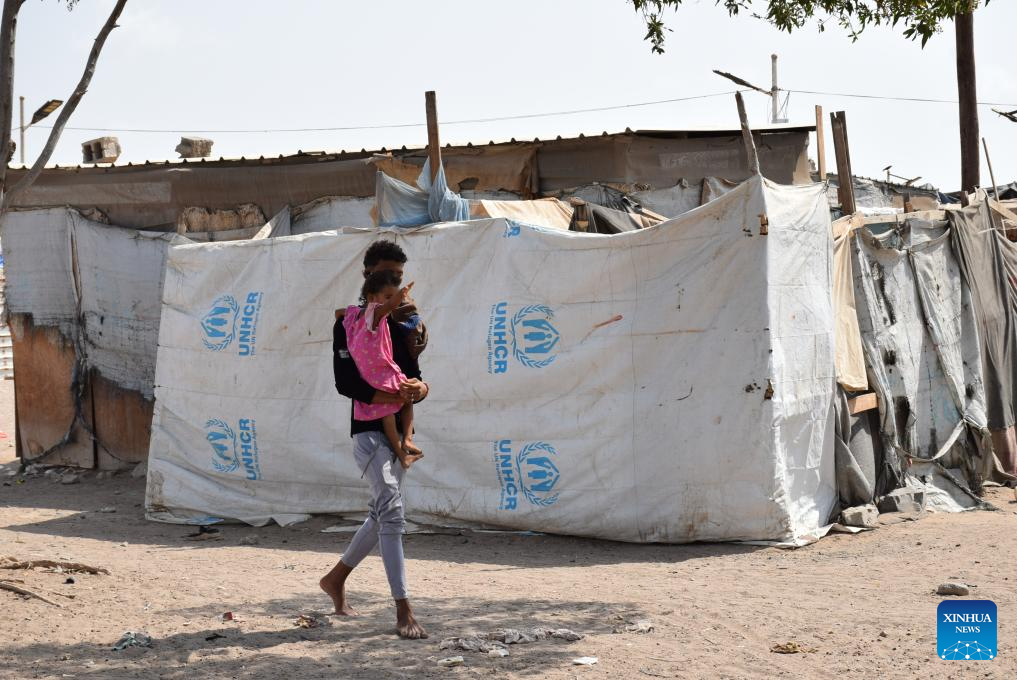
A displaced man holding his child walks beside tents at a temporary displacement camp on the outskirts of Aden, Yemen, Aug. 11, 2025. As the World Humanitarian Day is marked across countries on Tuesday, the Middle East and North Africa remain mired in some of the world's gravest crises, especially humanitarian ones. Across Gaza, Sudan, Syria, Lebanon and Yemen, armed conflict rages on amid hunger, diseases and collapsing water systems. The daily struggles to survive, of finding food, getting medicine or drawing water, now carry the risk of death. The pattern is consistent: Where war persists, hunger and disease follow. Humanitarian relief supplies may slow the pace, but without the political will to end the fighting, such critical aid falls drastically short. (Photo by Murad/Xinhua)
CAIRO, Aug. 19 (Xinhua) -- As the World Humanitarian Day is marked across countries on Tuesday, the Middle East and North Africa remain mired in some of the world's gravest crises, especially humanitarian ones.
Across Gaza, Sudan, Syria, Lebanon and Yemen, armed conflict rages on amid hunger, diseases and collapsing water systems. The daily struggles to survive, of finding food, getting medicine or drawing water, now carry the risk of death.
The pattern is consistent: Where war persists, hunger and disease follow. Humanitarian relief supplies may slow the pace, but without the political will to end the fighting, such critical aid falls drastically short.
GAZA: WHEN FOOD CAN KILL
Gaza demonstrates the crisis in its sharpest form. In the besieged coastal enclave, searching for food can be deadly.
With international aid tightly restricted, residents face two risky options: lining up at distribution points run by the Gaza Humanitarian Foundation backed by Israel and the United States, or rushing toward airdropped supplies. Both have led to deaths.
"They lied to us," said Abu Mohammed. "They tell us to get food, but then the army kills us."
He told Xinhua that his son died while trying to get flour. "He left early in the morning so that his children wouldn't go hungry. They killed him. This is non-justice."
Since late May, more than 1,800 people have been killed and over 13,000 wounded in or near the foundation sites in incidents involving Israeli forces, contractors, or armed groups, Gaza health officials say. Witnesses and medical workers call some locations "death traps."
The Israeli military disputes the figures and denies targeting civilians. The Foundation says the worst violence happened outside its compounds and rejects claims about its operations. The aid group was set up as an alternative to United Nations channels and has faced criticism over unclear finances and alleged breaches of humanitarian standards.
Its first executive director, Jake Wood, resigned weeks after it launched operations in Gaza, citing concerns over contradictions on "humanitarian principles of humanity, neutrality, impartiality, and independence."
Under pressure to address hunger, Israel recently allowed foreign airdropped supplies into Gaza. Aid agencies say the airdrops were inefficient and dangerous. Pallets weighing up to one metric ton sparked chaotic scramblings, often among hundreds of people, including children, sometimes with fatal results.
Aid through international organizations remains sharply limited. Relief groups say denials and delays have stalled their work. In July alone, they reported the Israeli blocking of more than 60 requests, causing food and medicine worth millions of U.S. dollars to be stuck in Jordan and Egypt.
The starvation toll is rising. Health officials have reported more than 220 deaths linked to hunger. Since January, 340 children have been treated for acute malnutrition, with nearly 50 deaths, mostly under five.
RAGING CIVIL WAR
Beyond Gaza, the crises elsewhere in the region festered, but away from the spotlight. The UN calls the civil war in Sudan one of the worst humanitarian catastrophes of this century. More than two years of fighting have displaced millions and shattered basic services.
In El Fasher, the capital of North Darfur, the siege by the Rapid Support Forces since May 2024 has cut off food and medical supplies for hundreds of thousands trapped, while hyperinflation wiped out savings and forced people to live on "umbaz" -- the residue from peanuts and sesame seeds after oil extraction, usually used as animal feed.
"We're eating what even animals wouldn't touch in normal times," a resident said, as doctors report increasing cases of ulcers and bloody diarrhea linked to such diets.
In Yemen, a brutal civil war is now in its second decade, and two-thirds of the poor Arab country's population -- more than 24 million people -- need help. Economic collapse, climate shocks, and restricted aid have exacerbated the urgency.
Syria offers perhaps the starkest portrait of a conflict turned permanent. Since the civil war erupted in 2011, waves of violence have battered the country, prompting mass displacements with consequences that extend far beyond its borders -- from Lebanon and Türkiye to Europe.
The UN reported that more than 14 million Syrians have been forced to flee their homes in search of safety since the war began. Of them, 7.4 million remain displaced inside Syria, where 70 percent of the population requires humanitarian assistance and 90 percent live below the poverty line. More than 6 million others live as refugees in neighboring countries, including Türkiye, Lebanon, Jordan and Iraq, or farther abroad.
Years of bombardment, economic isolation, and the destruction of infrastructure have gutted basic services. The slow relaxation of partial sanctions still does not make a recovery more likely.
MAN-MADE DISASTERS, POLITICAL ROOTS
The UN has long emphasized that these disasters are not inevitable. Behind each emergency lies a more complicated truth: Political factors -- more than poverty or natural hazards -- are driving the region's humanitarian collapse.
Analysts point to protracted wars, deliberate obstruction of aid, and above all, an erosion of the multilateral order by the United States and its unilateral actions as major forces that have stripped civilians of any safety net.
"The United States has not only contributed to these crises but has actively created and sustained them," said Esmat Mansour, a political analyst based in Ramallah.
The United States spent 17.9 billion U.S. dollars in military aid to Israel from October 2023 to October 2024, according to the Costs of War Project at Brown University. In addition, it vetoed UN Security Council resolutions urging a cease-fire and an end to the blockade on Gaza.
In July, Washington imposed sanctions on Palestinian Authority officials and members of the Palestine Liberation Organization, citing payments it said supported terrorism and efforts to bring the conflict to international courts. The U.S. move drew shrill criticism from the international community.
"The biggest failure (of the United States) lies in the inability to bring about an end to the war in Gaza and initiate a political process for implementing the two-state solution alongside the rest of the international community," said Roee Kibrik, head of research at Mitvim, the Israeli Institute for Regional Foreign Policies.
Critics also contend that broad, unilateral sanctions have deepened the economic collapse in both Syria and Yemen.
"The United States stands behind all the wars that prevail today in the world, particularly in the Middle East, whether directly or indirectly," said Mazen Chendeb, an expert on international relations in Lebanon.
Khalid Ahmed, a political scientist in Qatar, says that Washington's pursuit of regional dominance has undermined sovereignty and stability, and calls for "genuine multilateralism" in which states act as equal partners.
World Humanitarian Day, observed annually on Aug. 19, honors the 22 humanitarian workers killed in the 2003 bombing of the UN headquarters in Baghdad, Iraq, including then UN High Commissioner for Human Rights and UN Special Representative of the Secretary-General for Iraq, Sergio Vieira de Mello. More than two decades later, Iraq is still healing.
Experts say breaking the cycle requires more than emergency relief. It demands politics that is independent, inclusive, and dedicated to ending wars rather than managing them.
"The only way forward is to consolidate democracy and expand the role of people and youth in shaping their futures," Mansour said.
"Peace can only be built when peoples are empowered to make decisions that serve their countries, not the agendas of others," Mansour added. ■
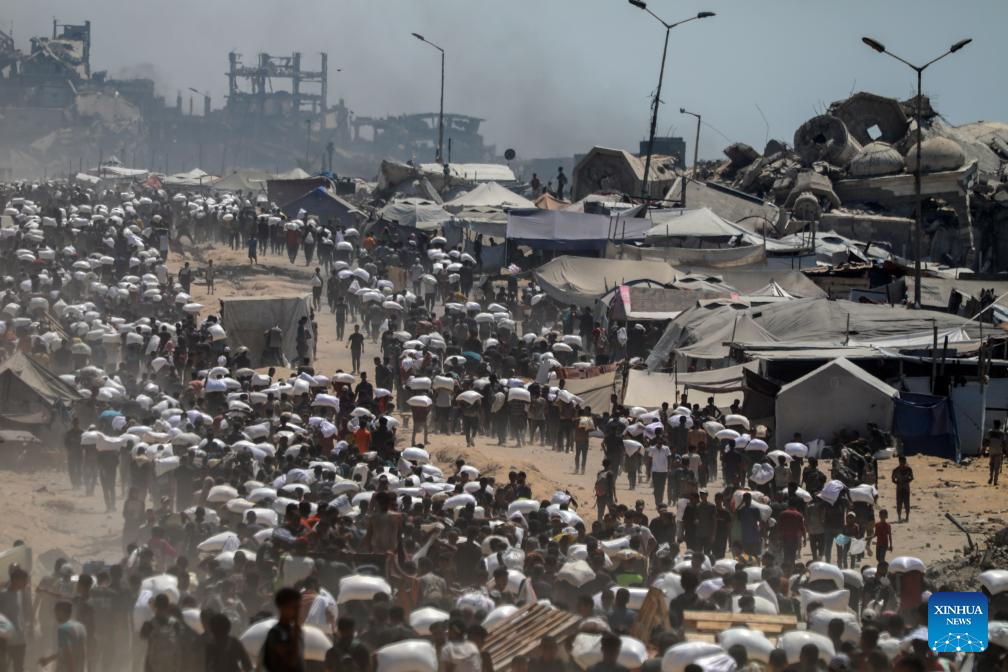
(250819) -- GAZA, Aug. 19, 2025 (Xinhua) -- Palestinians fetch humanitarian aid that entered Gaza through a border crossing, in Beit Lahia, northern Gaza Strip, on July 27, 2025.
As the World Humanitarian Day is marked across countries on Tuesday, the Middle East and North Africa remain mired in some of the world's gravest crises, especially humanitarian ones.
Across Gaza, Sudan, Syria, Lebanon and Yemen, armed conflict rages on amid hunger, diseases and collapsing water systems. The daily struggles to survive, of finding food, getting medicine or drawing water, now carry the risk of death.
The pattern is consistent: Where war persists, hunger and disease follow. Humanitarian relief supplies may slow the pace, but without the political will to end the fighting, such critical aid falls drastically short. (Photo by Rizek Abdeljawad/Xinhua)
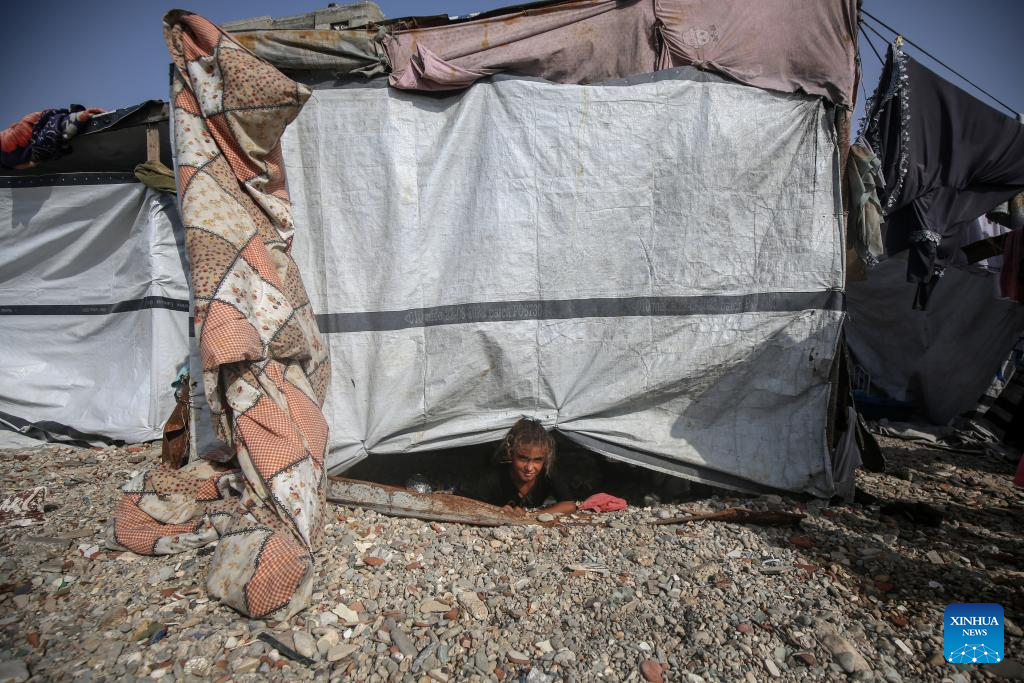
(250819) -- GAZA, Aug. 19, 2025 (Xinhua) -- A displaced Palestinian child is seen in the coastal area of Gaza City on Aug. 14, 2025.
As the World Humanitarian Day is marked across countries on Tuesday, the Middle East and North Africa remain mired in some of the world's gravest crises, especially humanitarian ones.
Across Gaza, Sudan, Syria, Lebanon and Yemen, armed conflict rages on amid hunger, diseases and collapsing water systems. The daily struggles to survive, of finding food, getting medicine or drawing water, now carry the risk of death.
The pattern is consistent: Where war persists, hunger and disease follow. Humanitarian relief supplies may slow the pace, but without the political will to end the fighting, such critical aid falls drastically short. (Photo by Rizek Abdeljawad/Xinhua)
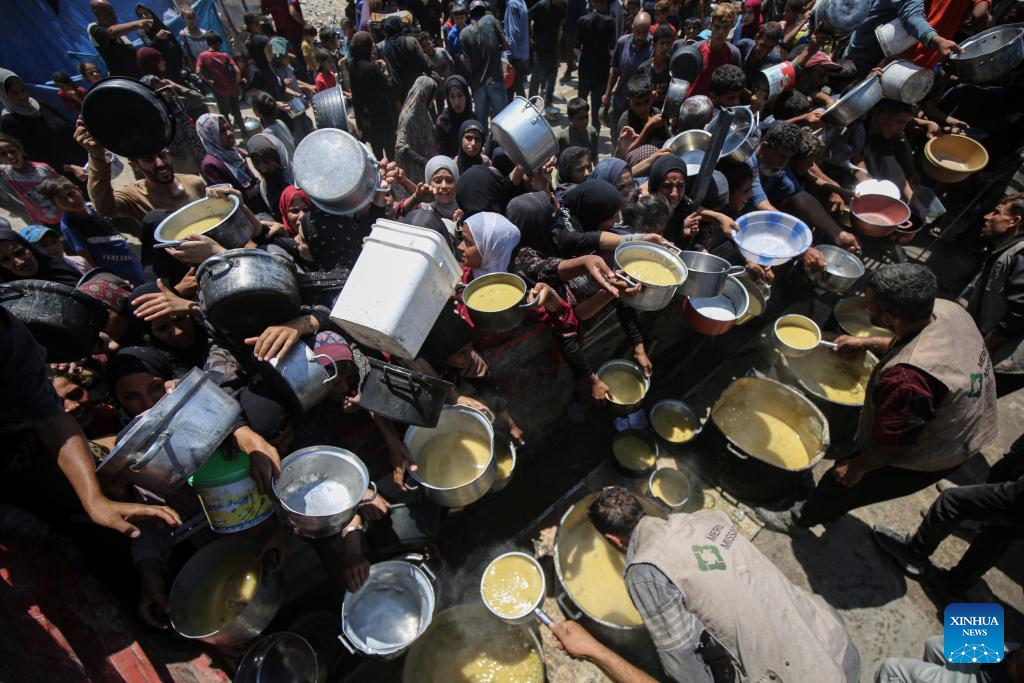
(250819) -- GAZA, Aug. 19, 2025 (Xinhua) -- Displaced Palestinians wait to receive free food in Gaza City on Aug. 2, 2025.
As the World Humanitarian Day is marked across countries on Tuesday, the Middle East and North Africa remain mired in some of the world's gravest crises, especially humanitarian ones.
Across Gaza, Sudan, Syria, Lebanon and Yemen, armed conflict rages on amid hunger, diseases and collapsing water systems. The daily struggles to survive, of finding food, getting medicine or drawing water, now carry the risk of death.
The pattern is consistent: Where war persists, hunger and disease follow. Humanitarian relief supplies may slow the pace, but without the political will to end the fighting, such critical aid falls drastically short. (Photo by Rizek Abdeljawad/Xinhua)
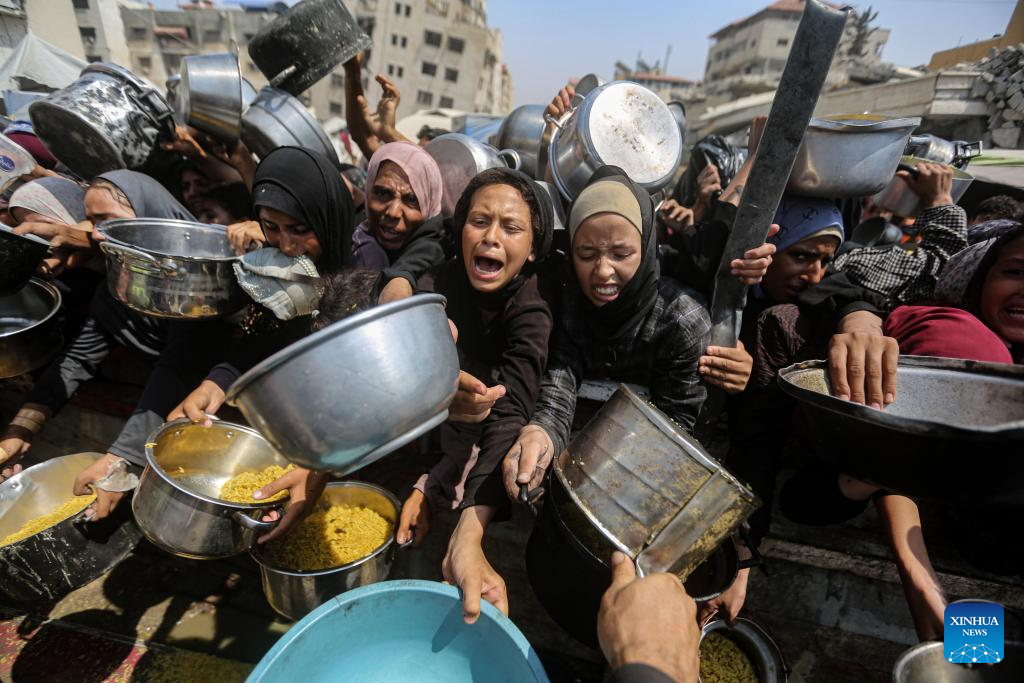
(250819) -- GAZA, Aug. 19, 2025 (Xinhua) -- Displaced Palestinians receive free food in Gaza City on Aug. 10, 2025.
As the World Humanitarian Day is marked across countries on Tuesday, the Middle East and North Africa remain mired in some of the world's gravest crises, especially humanitarian ones.
Across Gaza, Sudan, Syria, Lebanon and Yemen, armed conflict rages on amid hunger, diseases and collapsing water systems. The daily struggles to survive, of finding food, getting medicine or drawing water, now carry the risk of death.
The pattern is consistent: Where war persists, hunger and disease follow. Humanitarian relief supplies may slow the pace, but without the political will to end the fighting, such critical aid falls drastically short. (Photo by Rizek Abdeljawad/Xinhua)
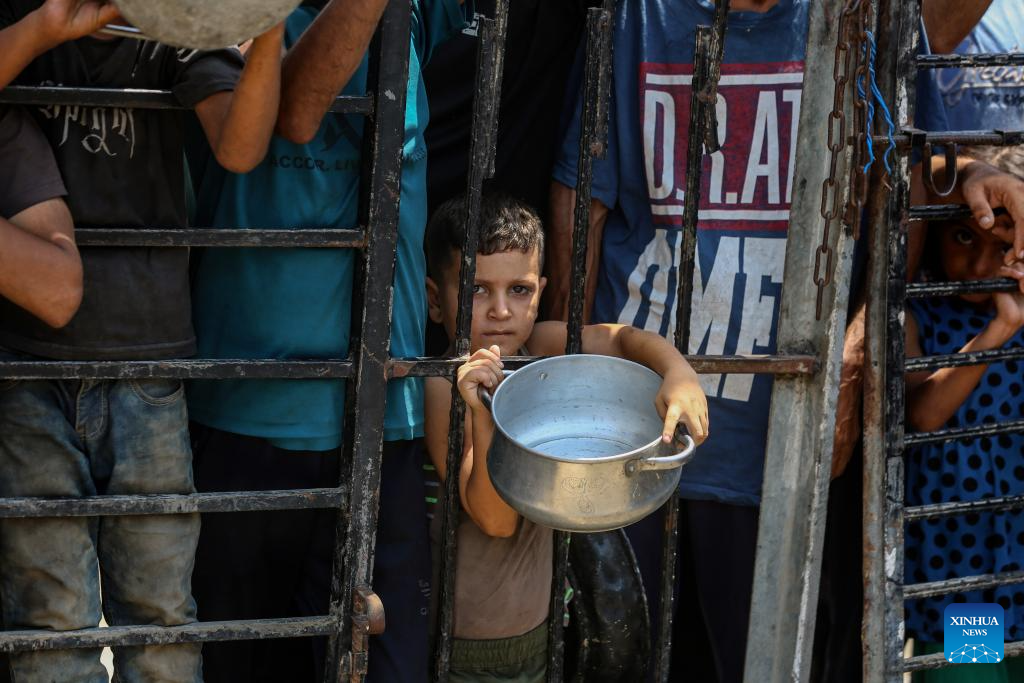
(250819) -- GAZA, Aug. 19, 2025 (Xinhua) -- Displaced Palestinians wait to receive free food in the west of Gaza City on Aug. 10, 2025.
As the World Humanitarian Day is marked across countries on Tuesday, the Middle East and North Africa remain mired in some of the world's gravest crises, especially humanitarian ones.
Across Gaza, Sudan, Syria, Lebanon and Yemen, armed conflict rages on amid hunger, diseases and collapsing water systems. The daily struggles to survive, of finding food, getting medicine or drawing water, now carry the risk of death.
The pattern is consistent: Where war persists, hunger and disease follow. Humanitarian relief supplies may slow the pace, but without the political will to end the fighting, such critical aid falls drastically short. (Photo by Rizek Abdeljawad/Xinhua)
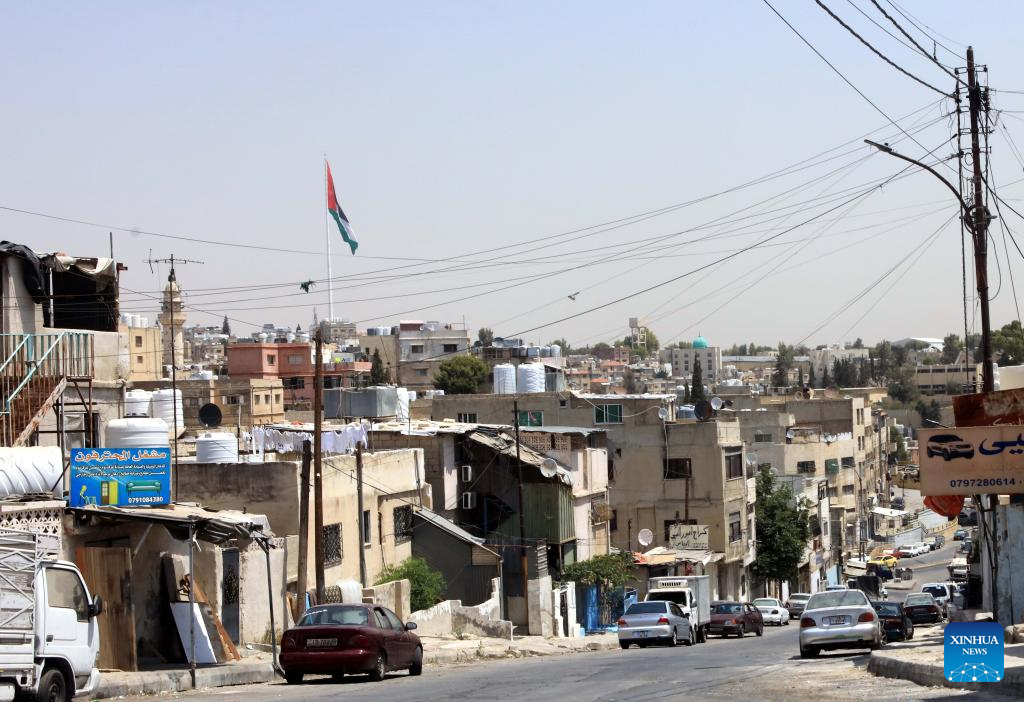
(250819) -- AMMAN, Aug. 19, 2025 (Xinhua) -- This photo taken on Aug. 14, 2025 shows a view of Jabal el-Hussein Camp in Amman, Jordan.
As the World Humanitarian Day is marked across countries on Tuesday, the Middle East and North Africa remain mired in some of the world's gravest crises, especially humanitarian ones.
Across Gaza, Sudan, Syria, Lebanon and Yemen, armed conflict rages on amid hunger, diseases and collapsing water systems. The daily struggles to survive, of finding food, getting medicine or drawing water, now carry the risk of death.
The pattern is consistent: Where war persists, hunger and disease follow. Humanitarian relief supplies may slow the pace, but without the political will to end the fighting, such critical aid falls drastically short. (Photo by Mohammad Abu Ghosh/Xinhua)
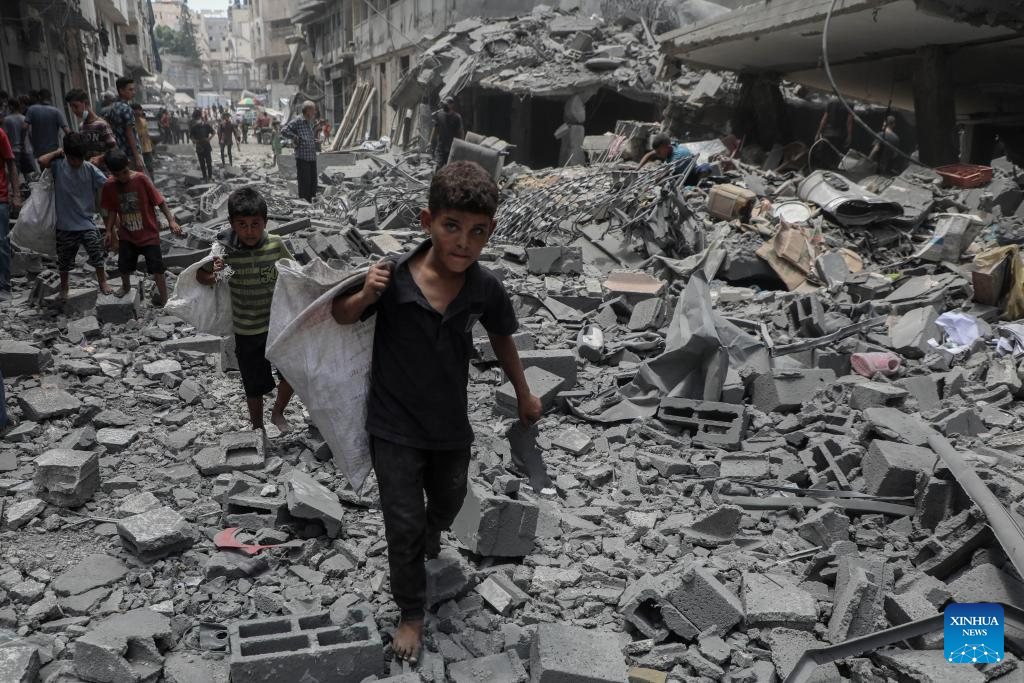
(250819) -- GAZA, Aug. 19, 2025 (Xinhua) -- Children carrying collected items walk on rubbles after an Israeli airstrike in Gaza City on Aug. 8, 2025.
As the World Humanitarian Day is marked across countries on Tuesday, the Middle East and North Africa remain mired in some of the world's gravest crises, especially humanitarian ones.
Across Gaza, Sudan, Syria, Lebanon and Yemen, armed conflict rages on amid hunger, diseases and collapsing water systems. The daily struggles to survive, of finding food, getting medicine or drawing water, now carry the risk of death.
The pattern is consistent: Where war persists, hunger and disease follow. Humanitarian relief supplies may slow the pace, but without the political will to end the fighting, such critical aid falls drastically short. (Photo by Rizek Abdeljawad/Xinhua)
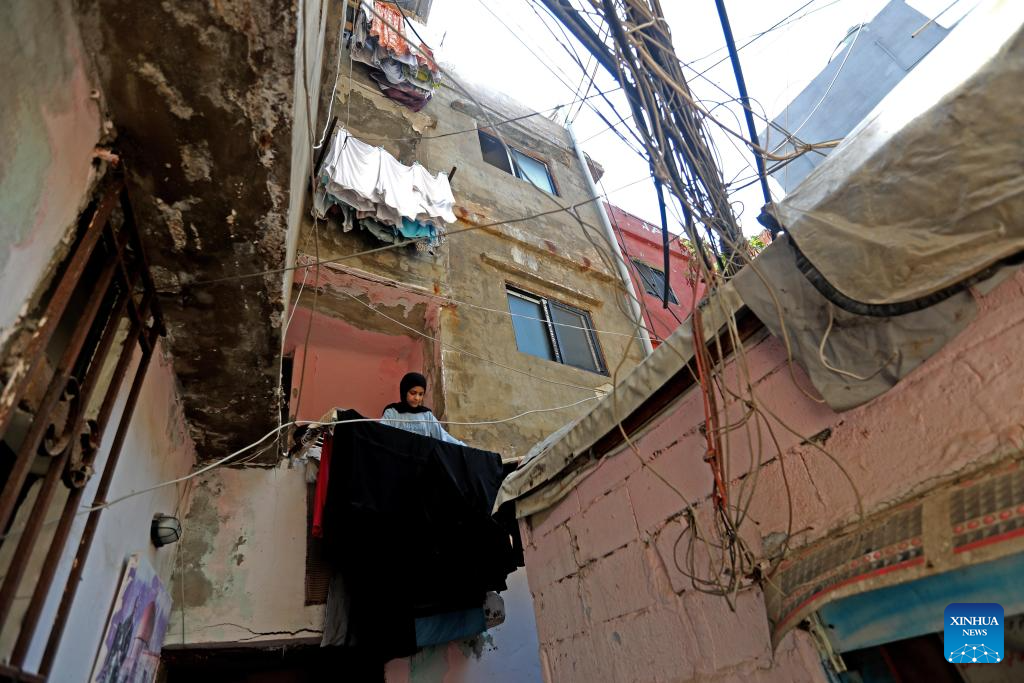
(250819) -- BEIRUT, Aug. 19, 2025 (Xinhua) -- A girl hangs laundry to dry in Burj al-Barajneh Palestinian refugee camp near Beirut, Lebanon, Aug. 14, 2025.
As the World Humanitarian Day is marked across countries on Tuesday, the Middle East and North Africa remain mired in some of the world's gravest crises, especially humanitarian ones.
Across Gaza, Sudan, Syria, Lebanon and Yemen, armed conflict rages on amid hunger, diseases and collapsing water systems. The daily struggles to survive, of finding food, getting medicine or drawing water, now carry the risk of death.
The pattern is consistent: Where war persists, hunger and disease follow. Humanitarian relief supplies may slow the pace, but without the political will to end the fighting, such critical aid falls drastically short. (Xinhua/Bilal Jawich)
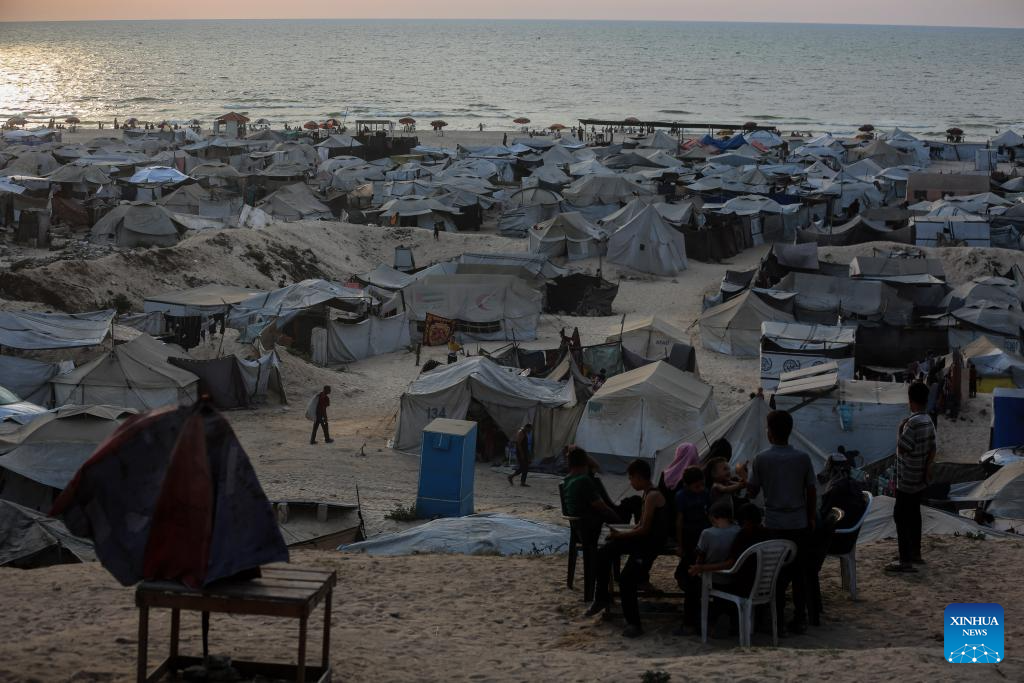
(250819) -- GAZA, Aug. 19, 2025 (Xinhua) -- Tents for displaced Palestinians are seen near a beach in Gaza City on Aug. 10, 2025.
As the World Humanitarian Day is marked across countries on Tuesday, the Middle East and North Africa remain mired in some of the world's gravest crises, especially humanitarian ones.
Across Gaza, Sudan, Syria, Lebanon and Yemen, armed conflict rages on amid hunger, diseases and collapsing water systems. The daily struggles to survive, of finding food, getting medicine or drawing water, now carry the risk of death.
The pattern is consistent: Where war persists, hunger and disease follow. Humanitarian relief supplies may slow the pace, but without the political will to end the fighting, such critical aid falls drastically short. (Photo by Rizek Abdeljawad/Xinhua)
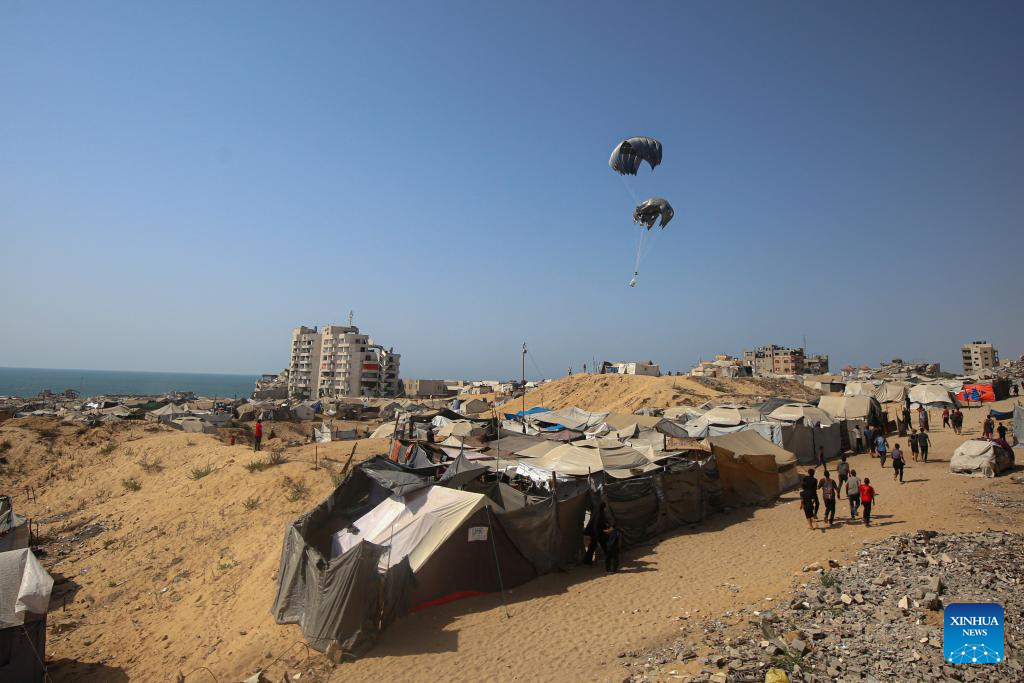
(250819) -- GAZA, Aug. 19, 2025 (Xinhua) -- This photo shows an airdrop of aid to Gaza City on Aug. 15, 2025.
As the World Humanitarian Day is marked across countries on Tuesday, the Middle East and North Africa remain mired in some of the world's gravest crises, especially humanitarian ones.
Across Gaza, Sudan, Syria, Lebanon and Yemen, armed conflict rages on amid hunger, diseases and collapsing water systems. The daily struggles to survive, of finding food, getting medicine or drawing water, now carry the risk of death.
The pattern is consistent: Where war persists, hunger and disease follow. Humanitarian relief supplies may slow the pace, but without the political will to end the fighting, such critical aid falls drastically short. (Photo by Rizek Abdeljawad/Xinhua)
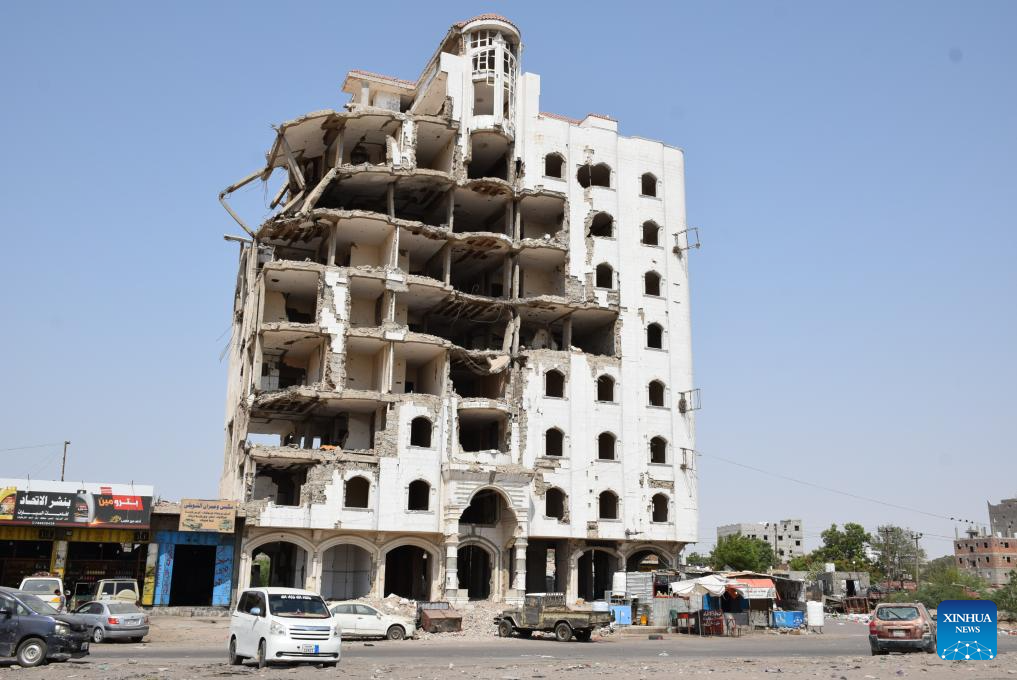
A building destroyed in conflicts between Yemen's government forces and the Houthi group is seen on the outskirts of Aden, Yemen, Aug. 11, 2025.
As the World Humanitarian Day is marked across countries on Tuesday, the Middle East and North Africa remain mired in some of the world's gravest crises, especially humanitarian ones.
Across Gaza, Sudan, Syria, Lebanon and Yemen, armed conflict rages on amid hunger, diseases and collapsing water systems. The daily struggles to survive, of finding food, getting medicine or drawing water, now carry the risk of death.
The pattern is consistent: Where war persists, hunger and disease follow. Humanitarian relief supplies may slow the pace, but without the political will to end the fighting, such critical aid falls drastically short. (Photo by Murad/Xinhua)
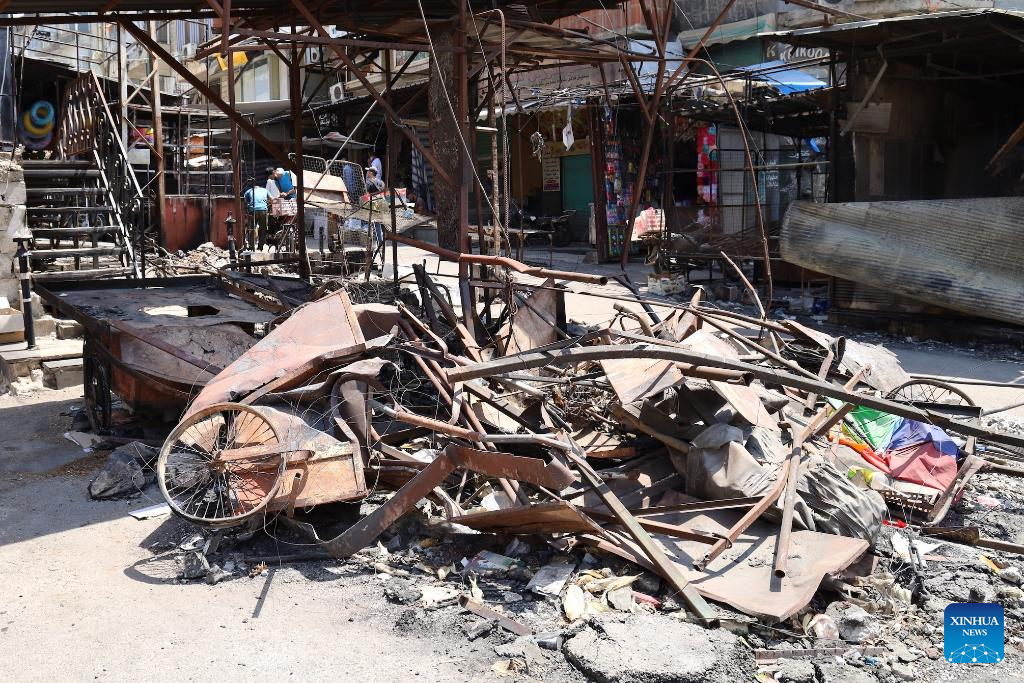
(250819) -- DAMASCUS, Aug. 19, 2025 (Xinhua) -- Destroyed shops are seen following conflicts in Sweida, Syria, Aug. 14, 2025.
As the World Humanitarian Day is marked across countries on Tuesday, the Middle East and North Africa remain mired in some of the world's gravest crises, especially humanitarian ones.
Across Gaza, Sudan, Syria, Lebanon and Yemen, armed conflict rages on amid hunger, diseases and collapsing water systems. The daily struggles to survive, of finding food, getting medicine or drawing water, now carry the risk of death.
The pattern is consistent: Where war persists, hunger and disease follow. Humanitarian relief supplies may slow the pace, but without the political will to end the fighting, such critical aid falls drastically short. (Photo by Monsef Memari/Xinhua)
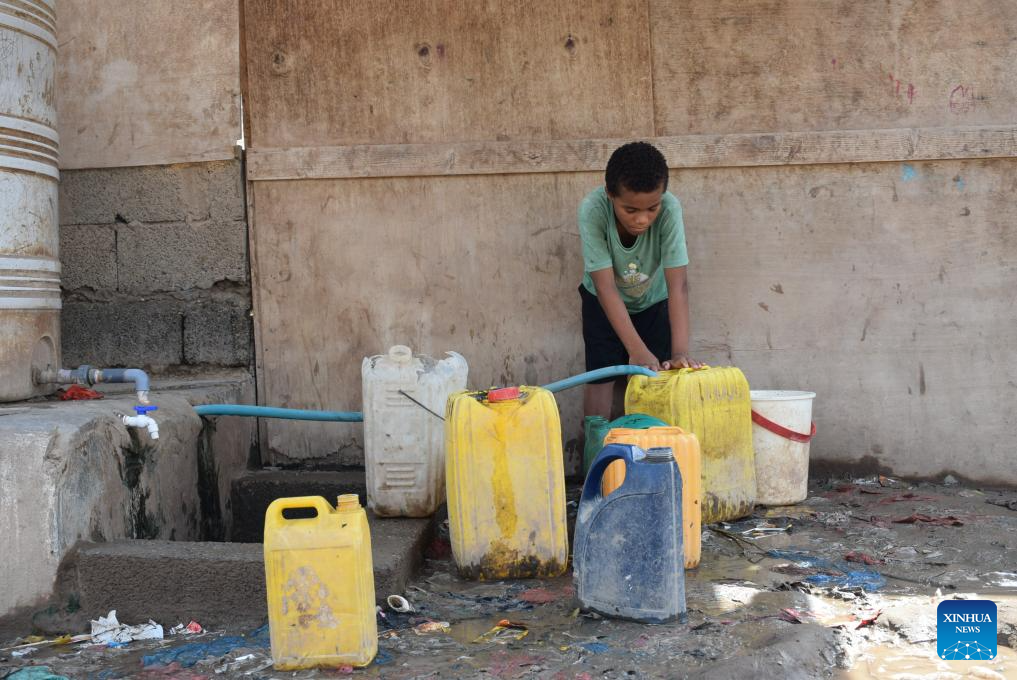
A displaced boy fills plastic containers with drinking water at a temporary displacement camp on the outskirts of Aden, Yemen, Aug. 11, 2025.
As the World Humanitarian Day is marked across countries on Tuesday, the Middle East and North Africa remain mired in some of the world's gravest crises, especially humanitarian ones.
Across Gaza, Sudan, Syria, Lebanon and Yemen, armed conflict rages on amid hunger, diseases and collapsing water systems. The daily struggles to survive, of finding food, getting medicine or drawing water, now carry the risk of death.
The pattern is consistent: Where war persists, hunger and disease follow. Humanitarian relief supplies may slow the pace, but without the political will to end the fighting, such critical aid falls drastically short. (Photo by Murad/Xinhua)



